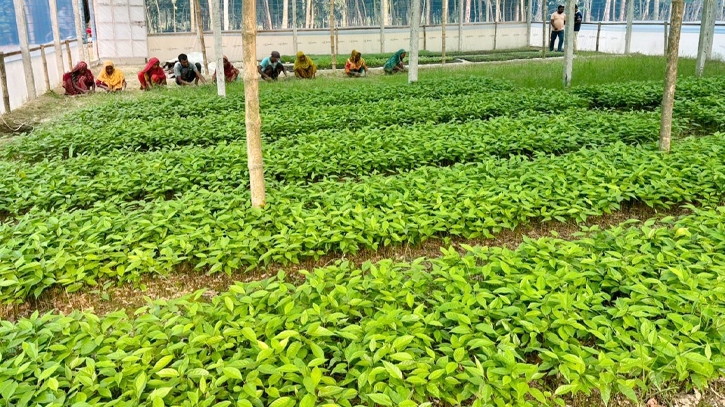
Photo: Courtesy
Standard Chartered Bangladesh (SCB) and Thengamara Mohila Sabuj Sangha (TMSS) are partnering to empower 11,000 farmers from Bogura, Joypurhat, Sirajganj, Natore, Pabna, and Rajshahi to adopt the eco-friendly agricultural practice of polyhouse farming – a modern farming method that enables year-round cultivation despite external conditions.
By providing beneficiaries with polyhouse development resources and the necessary training, the bank is optimising crop yield and quality while simultaneously catalysing income generation opportunities for thousands. As part of this initiative, Standard Chartered is supplying watermelon seeds and other vegetable seeds to beneficiaries to improve homestead gardening efforts, says a press release.
Naser Ezaz Bijoy, Chief Executive Officer, Standard Chartered Bangladesh, said, “For every USD 1 spent on adaptation in Bangladesh, an economic benefit of USD 10 can be generated – indicating a dire need to invest in adaptation projects. According to Standard Chartered’s The Adaptation Economy report, focus areas for adaptation in Bangladesh include the adoption of sustainable agriculture practices and improved water resource infrastructure.”
“Polyhouse farming brings these two focus areas into alignment, under one roof. Creating sustainable structures made of recyclable polythene and plastics, where a variety of crops can grow within a controlled and steady environment, allows our nation’s farmers to transcend the limitations imposed by external factors while saving water and reducing their reliance on fertiliser and pesticides. This transformative approach not only ensures consistent yields but also fosters resilience against the escalating threats of climate change, water scarcity, crop vulnerability, and pest infections.”
The bank will also help to set up vermicompost production centres, so that farmers can reduce their dependency on chemical fertiliser. In total, the bank will contribute over Tk 27 million to implement this project.
Lack of access to high quality seed inputs, water scarcity, and overuse of fertiliser and pesticides heavily impact Bangladesh’s agricultural sector. To build a more sustainable and productive system, Standard Chartered and TMSS will establish polyhouse farming structures, which will empower farmers to grow high value vegetables like broccoli, capsicum, cabbage, and lettuce, as well as other fruit and flowers together.
Professor Dr. Hosne-Ara Begum, Founder, Thengamara Mohila Sabuj Sangha (TMSS), said, “TMSS has been working for the development of farmers since beginning. The main purpose is to boost high-value crop farming in the drought-prone area through modern polyhouse farming methods. Not only will the farmers benefit financially, but this will also be a boost to our economy. So, I presume this project will help lot of farmers to produce many varieties of crops during the off season, which will improve their economic condition.”
As a steadfast partner in Bangladesh's remarkable journey of growth and resilience, Standard Chartered upholds a legacy of commitment spanning over 119 years. Guided by an enduring dedication to progress, the Bank stands firmly in support of the country's vital agriculture sector. For over a century, Standard Chartered has invested in communities, expanded services, created new opportunities for stakeholders, and fostered inclusive initiatives – all of which exemplify the Bank’s commitment to cultivating sustainable development in Bangladesh's agricultural landscape.
Thengamara Mohila Sabuj Sangha – also known as TMSS – is a Bangladeshi micro credit NGO. Founded by Professor Dr. Hosne-Ara Begum in 1980, TMSS is working to alleviate poverty, empower of women, improve of socio-economic infrastructure, and build a society with the ability to cope with advances in information and communication technology. TMSS operates in all 64 of Bangladesh’s districts.
Messenger/Disha








